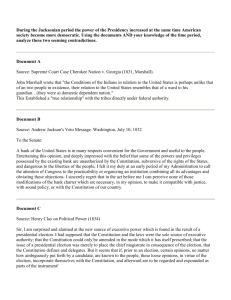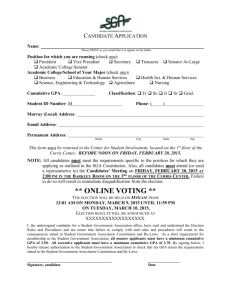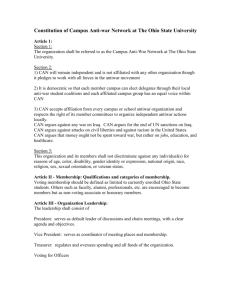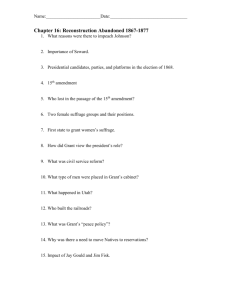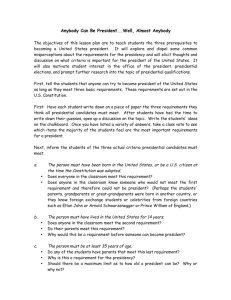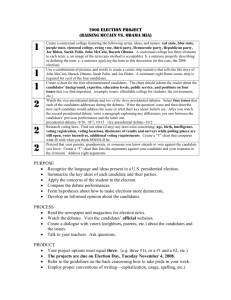Abstract - SAVAP International
advertisement
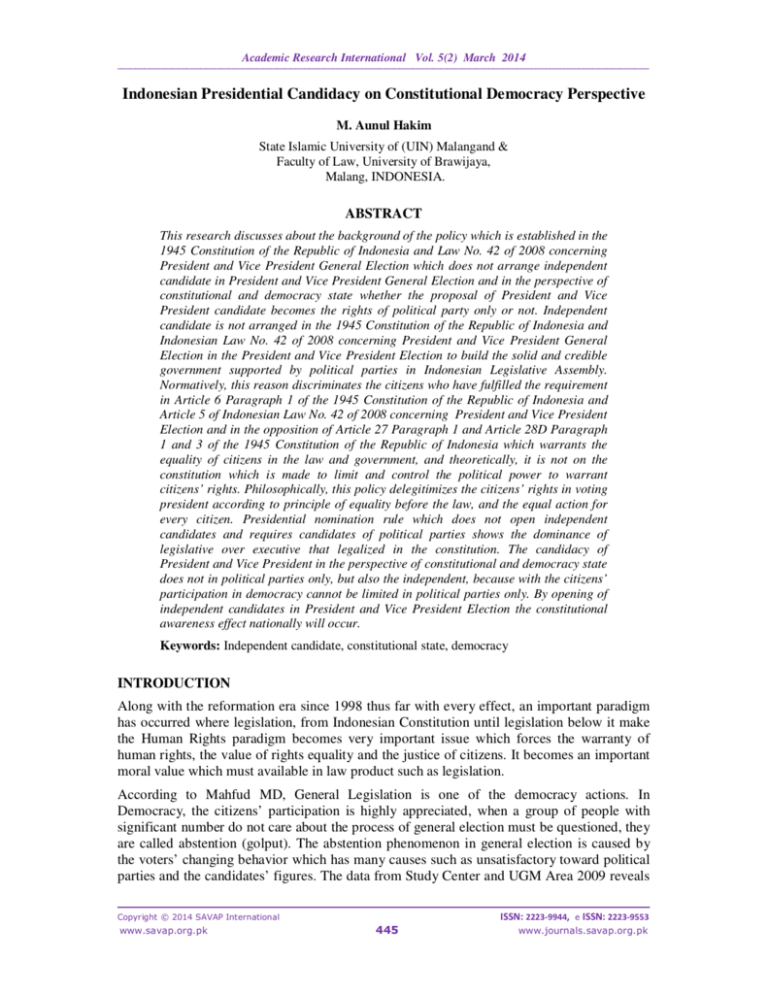
Academic Research International Vol. 5(2) March 2014 __________________________________________________________________________________________________________________________________________________________ __________________________________________________________________________________________________________________________________________________________ __________________________________________________________________________________________________________________________________________________ _____________________________________________________________________________________________________________________________ _____________________________ _____________________________________________________________________________________________________________________________ _____________________ Indonesian Presidential Candidacy on Constitutional Democracy Perspective M. Aunul Hakim State Islamic University of (UIN) Malangand & Faculty of Law, University of Brawijaya, Malang, INDONESIA. ABSTRACT This research discusses about the background of the policy which is established in the 1945 Constitution of the Republic of Indonesia and Law No. 42 of 2008 concerning President and Vice President General Election which does not arrange independent candidate in President and Vice President General Election and in the perspective of constitutional and democracy state whether the proposal of President and Vice President candidate becomes the rights of political party only or not. Independent candidate is not arranged in the 1945 Constitution of the Republic of Indonesia and Indonesian Law No. 42 of 2008 concerning President and Vice President General Election in the President and Vice President Election to build the solid and credible government supported by political parties in Indonesian Legislative Assembly. Normatively, this reason discriminates the citizens who have fulfilled the requirement in Article 6 Paragraph 1 of the 1945 Constitution of the Republic of Indonesia and Article 5 of Indonesian Law No. 42 of 2008 concerning President and Vice President Election and in the opposition of Article 27 Paragraph 1 and Article 28D Paragraph 1 and 3 of the 1945 Constitution of the Republic of Indonesia which warrants the equality of citizens in the law and government, and theoretically, it is not on the constitution which is made to limit and control the political power to warrant citizens’ rights. Philosophically, this policy delegitimizes the citizens’ rights in voting president according to principle of equality before the law, and the equal action for every citizen. Presidential nomination rule which does not open independent candidates and requires candidates of political parties shows the dominance of legislative over executive that legalized in the constitution. The candidacy of President and Vice President in the perspective of constitutional and democracy state does not in political parties only, but also the independent, because with the citizens’ participation in democracy cannot be limited in political parties only. By opening of independent candidates in President and Vice President Election the constitutional awareness effect nationally will occur. Keywords: Independent candidate, constitutional state, democracy INTRODUCTION Along with the reformation era since 1998 thus far with every effect, an important paradigm has occurred where legislation, from Indonesian Constitution until legislation below it make the Human Rights paradigm becomes very important issue which forces the warranty of human rights, the value of rights equality and the justice of citizens. It becomes an important moral value which must available in law product such as legislation. According to Mahfud MD, General Legislation is one of the democracy actions. In Democracy, the citizens’ participation is highly appreciated, when a group of people with significant number do not care about the process of general election must be questioned, they are called abstention (golput). The abstention phenomenon in general election is caused by the voters’ changing behavior which has many causes such as unsatisfactory toward political parties and the candidates’ figures. The data from Study Center and UGM Area 2009 reveals ISSN: 2223-9944, Copyright © 2014 SAVAP International www.savap.org.pk 445 e ISSN: 2223-9553 www.journals.savap.org.pk Academic Research International Vol. 5(2) March 2014 __________________________________________________________________________________________________________________________________________________________________________________________________________________________________________________________ ___________________________________________________________________________________________________________________________________ __________________________________________________ _____________________________________________________________________________________________________________________________ _____________________________________________________________________________________________________________________________ ______ ____________________________________________ the increasing abstention percentage as follow: General Election 1971 of 6.64%, 1977 of 8.40%, 1982 of 8.53%, 1987 of 8.39%, 1992 of 9.09%, 1997 of 9.42%, 1999 of 10.21%, 2004 0f 23.34%, and the last general election year 2009, the abstention was 39.1%. In the election Regional Chief, independent candidates are allowed in the changes of Law No. 32 of 2004 concerning Local Government becomes Law No. 12 of 2008 after the Constitutional Court grand testing proposal Article 56 Law No. 32 of 2004 towards Indonesian Constitution 1945. From the Constitutional Court’s decision No. 5/PUU-V/2/2007 on July, 23 2007, independent candidates can nominate themselves in the election of regional chief (governor, regent and mayor) without joining political party. Constitutional Court’s reason in that decision is because the 1945 Constitution of the Republic of Indonesia Article 18 Paragraph (4) requires the Regional Chief Election is voted democratically. The citizens’ urge for independent candidates can be observed from the survey done by Indonesian Pollster 2007 which describes the Indonesian citizens’ support toward independent candidates. The Indonesian Pollster’s discovery in 2007 describes how the Indonesian citizens’ highly support the independent candidates, from the sample taken from all of Indonesian provinces, especially for items suggest that the President candidacy should not only from political party, but also from independent candidates which shows that 4.5% are very agree, 64.3% are agree, and only 19.7% are disagree, 0.5% are very disagree. The argumentation from the opposition group about independent candidates in President Election can be seen in the treatise of Constitutional Court’s Assembly No. 56/PUU-VI/2008. Isnaeni Ramdahan states that on fourth principle of Pancasila, the independent candidates must be eliminated because of individualism and in-collectivism as required in fourth principle about representative democracy. Kacung Marijan states that group of parties which bring the Presidential Candidates are the development of consensus democracy to build the stable government system in Indonesia, because Indonesia does not follow two-party system, but multi-party system. Cecep Effendi states that multi-party system in recent Indonesian presidential system causes problem in President’s relationship with legislation, President does not need legislative support to state the policies but the support will be needed when the President has to implement the strategic policies. The Constitutional Court’s decision No. 56/PUU-VI/2008 states that articles in Law No. 42 of 2008 concerning President and Vice President Election do not contradict with the whole the 1945 Constitution. But there are three Constitutional Court’s judges have dissenting opinion, they are Abdul Mukhtie Fadjar, Maruarar Siahaan, and Akil Mochtar. According to Abdul Mukhtie Fadjar, Article 6A of the 1945 Constitution does not adjust requirement, but about way or procedure of candidacy which must not reject anyone who meet the requirement to become President and Vice President candidates, whether nominating themselves or being nominated by political party or political parties coalition. Maruarar Siahaan states that this problem is related to human rights, it is improper if an argument tries to overrule the principles of human rights as fundamental rights as a relevant part in the 1945 Constitution which must be understood and interpreted the articles holistically. According to M. Akil Mochtar, Article 6A the 1945 Constitution has broken the rights of each citizen who has same position, rights, and opportunity in government as regulated in Article 27 Paragraph 1, Article 28D Paragraph 3, and Article 28I Paragraph 2 of the 1945 Constitution. ISSN: 2223-9944, Copyright © 2014 SAVAP International www.savap.org.pk 446 e ISSN: 2223-9553 www.journals.savap.org.pk Academic Research International Vol. 5(2) March 2014 __________________________________________________________________________________________________________________________________________________________ __________________________________________________________________________________________________________________________________________________________ __________________________________________________________________________________________________________________________________________________ _____________________________________________________________________________________________________________________________ _____________________________ _____________________________________________________________________________________________________________________________ _____________________ THE POLITICAL PROCESS OF 1945 CONSTITUTION AMENDMENTS IN ORGANIZING PRESIDENTIAL ELECTION The amendments of 1945 Constitution are not separated from its background reasons. The regulation changes of Presidential Election also have historical reason, philosophical reason, legitimate reason, theoretical reason, and political reason. From historical point of view, 1945 Constitution was designed by founding fathers as a “temporary” constitution because it was arranged in a hurry situation. From philosophical point of view, in 1945 Constitution there is a mix-up of some contrary ideas, like the contrary ideas between the ideology of people sovereignty and the ideology of integral country, and between the ideology of law-based state and the ideology of power-based state. From juridical point of view, any written constitution contains the provision on constitution amendments. It is a form of conviction of constitution maker that the constitution is human product that is far from perfect. The theoretical reason states that in the perspective of constitution theory, the function of a constitution for a state is to confine it from arbitrary act. The existence of 1945 Constitution as constitution is often used as the basic instrument legitimacy of authoritarian state that was practiced by President Soekarno and President Soeharto. Based on the reasons, the amendment of 1945 Constitution is directed to the availability of a democratic constitution—a constitution which guarantees legal certainty in arranging state institutions and their authorities, legal certainty to citizens’ right protection and the availability of checks and balances mechanism in state administration. The political process and debate in the arrangement of the 1945 Constitution draft in filling the position of President and Vice President, from Article 6 becomes Article 6 and 6A, is very serious. Finally in 2001 the third amendment was approved. There are a lot of intense debates among Ad Hoc Committee, experts team, and commission members in the arrangement of the amendment draft of article 6A of 1945 Constitution. One of the problems was the discussion who has the right to nominate President and Vice President. When the draft arranged by adhoc committee decided that the nomination must be through party, this idea triggered difference among council members. The debate about whether the independent candidate can be regulated in Article 6A or not. The forum then split into three; the first opinion disagree with the independent candidate in the President Election; the second opinion proposed the independent candidate in Presidential Election along with political parties, and the third opinion proposed that the arrangements of Presidential Election should be regulated in a separate law. In the end of formulating article 6A on the procedures of presidential election, there is no agreement in the PAH I and Comission court. Finally the leaders of political parties with their strong position can solve the heterogenity of their members’ opinions through lobbying meeting because political parties have their own interests so that the position of political parties in the Constitution can be included and the law on President and Vice President Election can be arranged as soon as possible without any obstacle. In addition, the position of political parties as the only door to the first and second position of Republic of Indonesia become strong without any independent candidates. When a debate has not been solved, the party leaders hold a meeting to encourage their fraction in MPR to immediately agree to solve the different opinions so that the entire amendment process of 1945 Constitution can be finished in MPR Annual Assembly in the year of 2001. Finally the formulation of Article 6A determines that the nomination of President and Vice President is only proposed by political parties as it is stated in Article 6A paragaph 2 of 1945 Constitution “The pairs of candidates for President and Vice-President shall be proposed prior to the holding of general elections by ISSN: 2223-9944, Copyright © 2014 SAVAP International www.savap.org.pk 447 e ISSN: 2223-9553 www.journals.savap.org.pk Academic Research International Vol. 5(2) March 2014 __________________________________________________________________________________________________________________________________________________________________________________________________________________________________________________________ ___________________________________________________________________________________________________________________________________ __________________________________________________ _____________________________________________________________________________________________________________________________ _____________________________________________________________________________________________________________________________ ______ ____________________________________________ political parties or coalitions of political parties which are participants in the general elections.” The main doer of 1945 Constitution amendment are the members adhoc committee who represent fractions in MPR, but their roles are not separated from the roles of each Party Leadership Council (DPP).It can be seen from the occurrence of a never-ending-debate as a respond to the upcoming Annual Conference of People’s Representative Assembly in which all parties’ and committee’s chief do lobbying as stated by Valina Singka Subekti as follows. Thus, a meeting for the leaders of each party is conducted so that the Central Leadership Board of parties can encourage each faction in People’s Representative Assembly to deal with the different opinions so the changing process of 1945 Constitution of the Republic of Indonesia can be elucidated on the People’s Representative Assembly’s Annual Conference in 2001. Moreover, on the last days of the Annual Conference in 2001 – after all factions have accomplished the meetings of the Committee A of the People’s Representative Assembly and the People’s Representative Assembly’s Plenary Meeting will be shortly conducted – Amin Rais invites all the leaders of People’s Representative Assembly’s factions to join the meetings to solve the factions’ different point of view. An effort is taken for the process of formulating the regulations for the Presidential Election through conference and debate in order to make the regulations, which will be formulated and validated within the constitution, very democratic. However, the local political elites understand the meaning of “democratic” as the freedom of having different opinions which is then compromised into an agreement as stated by Mohammad Ridwan. It then creates a constitution based on the agreement for their own importance. Individual candidate doesn’t have a chance to recommend himself since it is regulated in the regulation which is better to be regulated in the Law so that it can be considered essential and the changing process can be easier. However, the local political elites demand a prohibition for individual candidates. INDIVIDUAL CANDIDATE BASED ON STATE OF LAW AND DEMOCRACY There are three types of general election namely the general election of the members of People's Representative Council, Regional Representative Council, Regional People's Representative Council; the Presidential and Vice Presidential general election; and the Regional Chief general election (governor, regent, and mayor). The presidential election has some similarities with the Regional Chief election as followed: 1. The similarities with the executive board. The Regional Chief election (which consists of governor, regent, and mayor) and the Presidential and Vice Presidential are differentiated by the different level of the admission of position manner within the executive board. 2. The similarities in one regime of the general election law and one organizer called as the General Election Commission (KPU). Article 1 Paragraph 4 of the law No. 22 of 2007 concerning the General Election Organizer which elaborates that the General Election consists of legislative, presidential, and Regional Chief election that implicates in the involvement general election of regional chief within the regime of general election law. 3. The similarities in the conflict settlement of general election result. Article 236C, Law No. 12 of 2008 explains that the conflict settlement is accomplished in the Constitutional Court as well as for the conflict settlement of presidential election. ISSN: 2223-9944, Copyright © 2014 SAVAP International www.savap.org.pk 448 e ISSN: 2223-9553 www.journals.savap.org.pk Academic Research International Vol. 5(2) March 2014 __________________________________________________________________________________________________________________________________________________________ __________________________________________________________________________________________________________________________________________________________ __________________________________________________________________________________________________________________________________________________ _____________________________________________________________________________________________________________________________ _____________________________ _____________________________________________________________________________________________________________________________ _____________________ The candidacy regulations/rules in the Regional Chief General Election have been determined through political party and individual candidate. Based on Article 59 Paragraph 1, Law No. 12 of 2008 concerning the second change of Law No. 32 of 2004 that regulates about Regional government, the regional chief general election candidates are political parties and individuals. This adjustment occurred after the Constitutional Court has allowed individual candidates to join in the election all around provinces, regencies, and cities located in the Republic of Indonesia area as stated in the Case Management Hearing No. 5/PUUV/2007. Within its decision, the Constitutional Court suggests that the possibility of the regional chief and vice regional chief candidacy individually outside Nangroe Aceh Darusalam Province caused by two major possibilities. First, the Republic of Indonesia Law No. 31 of 2002 concerning Political Party is stated in d that mentions “political party is one important form of society’s participation in improving the democratic life which sustains freedom, similarity, togetherness, and honesty.” Thus, the opportunity for individual candidates becomes reasonable since it is individual positions that are required. Second, the opportunity given for individual candidates in Aceh has created a new reality in a constitutional dynamics which triggers constitutional awareness nationally. Third, it is hoped that there won’t be a dualism lied within the implementation of Article 18 Paragraph 4 of the 1945 Constitution of the Republic of Indonesia which may cause the violation of citizens’ right that is assured by Article 28D Paragraphs 1 and 3 of the 1945 Constitution of the Republic of Indonesia. Article 18 Paragraph 4 of the 1945 Constitution of the Republic of Indonesia says “Governors, Regents (bupati) and Mayors (walikota), respectively as head of regional government of the provinces, regencies and municipalities, shall be elected democratically.” The phrase “elected democratically” becomes the important reason why the Regional Chief candidates from the political party or coalition are not considered democratic and contradicted with the 1945 Constitution of the Republic of Indonesia. It is also contradicts with Article 27 Paragraph 1. Article 28D Paragraph 3, and Article 28I Paragraph 2 that assure the citizens’ equality before the law and government. The Constitutional Court conducts a judicial review of Law No. 42 of 2008 concerning the 1945 Constitution of the Republic of Indonesia in which there is no statement allows individual candidates to be involved in Presidential election. At that time, based on the verdict No. 56/PUU-VI/2008, the Constitutional Court refuses the petition for giving opportunities to individual candidates by giving original intent of Article 6A Paragraph 2 as the reason which states “Each ticket of candidates for President and Vice-President shall be proposed prior to the holding of general elections by political parties or coalitions of political parties which are participants in the general elections.” It means that the only candidates allowed are come from political parties. Thus, according to the writer, the logics of law used in the Constitutional Court verdict No. 56/PUU-VI/2008 contradicts with the logics of law used in verdict No. 5/PUU-V/2007. By closing the individual candidates’ opportunity, the Presidential election cannot be considered democratic. Indonesia is a state that implements a Presidential System of Government. In the political tradition of Presidential system, the head of state/government (President) is not the representative of the political parties in political institution of parliament. One of the particular characteristics of a Presidential System of Government is the direct election of the head of government. The result of the election is the basis of power possessed by the President as both the head of government and the head of the state. It exactly differentiates the logics of presidential with parliamentary system. A president has the direct mandate given by the citizens but the only one who has mandate in parliamentary system is the parliament ISSN: 2223-9944, Copyright © 2014 SAVAP International www.savap.org.pk 449 e ISSN: 2223-9553 www.journals.savap.org.pk Academic Research International Vol. 5(2) March 2014 __________________________________________________________________________________________________________________________________________________________________________________________________________________________________________________________ ___________________________________________________________________________________________________________________________________ __________________________________________________ _____________________________________________________________________________________________________________________________ _____________________________________________________________________________________________________________________________ ______ ____________________________________________ which is given the authority to elect the head of government. Hendarmin describes that the main object wanted in parliamentary system of government is the parliament itself, but the main object in presidential system is the president. It differs the role of political parties in both government systems. The rights of Indonesian citizens in government related to their human rights to vote and being voted is guaranteed by the article 43 paragraph 1 Law No. 39 of 1999 concerning Human Rights: “Every citizen has the right to vote and be voted for in general elections and has equal rights to a direct, free, secret, fair and just vote, in accordance with prevailing law.” The 1945 Constitution of the Republic of Indonesia, which has been through four amendments, gives foundation for state live by guarranting human right in Chapter XA. It consists of ten articles, article 28A to 28J. In the articles 27 and 28 the state guarantees its citizens’ freedom to associate, assemble, express written and oral opinions and also citizens’ equal rights in the law and government. The right to vote and be voted in the general election is inseparable with the duty as a citizen to serve the state. It also gives opportunity for the citizens to do their duties. The rights implement liberty rights, political rights, and equality rights. Laws is prohibited to close the opportunity for nonpolitical party candidates to respect citizen right. Citizens who fulfill the requirement to be President and Vice President candidates as stated in the article 6 paragraph 1 of 1945 Constitution of the Republic of Indonesia and article 5 Law No. 42 of 2008 concerning President and Vice President Requirements, independent candidates shall not be rejected by the procedure of article 6A paragraph 2 which requires political party sponsor. Political party or political party coalition is a ‘vehicle’ which can be used as long as the requirements are met. In conclusion, the presidential candidacy in the perspective of law and democracy state has no requirement that the candidates must be from political party. If independent candidate in Presidential election has legal protection, then it will bring state to more democratic life. Political party will be motivated to compete against independent candidates in sponsoring its candidate. Eventually, the party will upgrade its recruitment system to an open system and decrease the money politic in recruiting its cadres and sponsoring candidates for executive position. In a bigger scale, independent canidates may decrease or prevent political party oligarchy. When elected in the election of President and Vice president, they will raise support from most of the people who has vote them. It will become a great power for the candidate pair for having people behind their winning. In presidential system, the position of president is equal with the power of political party in the parliament. The parliament has no right to dismiss the president because the president is not under the parliament. Therefore, the president relatively need no support from the majority of parliament members. He or she does not engage to any political party and worry about rules or bargaining process with political party. Independent candidate will place a competent person in his or her cabinet. If the support of House of Representatives support is considered important, the president can propose cooperation with willing political parties to form coalition. In this position, the president has a higher bargaining power. CONCLUSION The 1945 Constitution of the Republic of Indonesia and Law No. 42 of 2008 concerning Election of President and Vice President give no opportunity for independent candidates in the election of president and vice president to create a solid and credible government supported by political parties in the House of Representative. The reason has no adequate normative, theoretical and philosophical basis. First, it normatively discriminates citizen who ISSN: 2223-9944, Copyright © 2014 SAVAP International www.savap.org.pk 450 e ISSN: 2223-9553 www.journals.savap.org.pk Academic Research International Vol. 5(2) March 2014 __________________________________________________________________________________________________________________________________________________________ __________________________________________________________________________________________________________________________________________________________ __________________________________________________________________________________________________________________________________________________ _____________________________________________________________________________________________________________________________ _____________________________ _____________________________________________________________________________________________________________________________ _____________________ has meet the requirements in the article 6 paragraph 1 of 1945 Constitution and article 5 Law No. 42 of 2008 concerning Election of President and Vice President and contradicts the articles 27 paragraph 1 and 28D paragraph 1 of 1945 Constitution; Second, theoretically the article 6A paragraph 2 of 1945 Constitution is not in accordance with the purpose of making the constitution in the first place, that is to formulate ways to restrict and control political power in order to guarantee people’s right. Presidential nomination rule which does not open independent candidates and requires candidates of political parties shows the dominance of legislative over executive that legalized in the constitution. Third, phylosophically the right of president and vice president candidacy belongs to political party or coalition who have delegitimized the right of people who are free to votethe president based on similia similibus principle. It covers the equality before the law and equal treatment for all the citizens. The president and vice president candidacy in the perspective of law and democracy state can also be done through independent candidacy for people sovereignity. An opportunity for invidual candidate will grow constitutional awareness nationally, and prevent dialism in carrying out a democratic regional election. ACKNOWLEDGEMENTS This article is dedicated to civitas academica of Brawijaya University. They have already contributed significantly to this article. ISSN: 2223-9944, Copyright © 2014 SAVAP International www.savap.org.pk 451 e ISSN: 2223-9553 www.journals.savap.org.pk Academic Research International Vol. 5(2) March 2014 __________________________________________________________________________________________________________________________________________________________________________________________________________________________________________________________ ___________________________________________________________________________________________________________________________________ __________________________________________________ _____________________________________________________________________________________________________________________________ _____________________________________________________________________________________________________________________________ ______ ____________________________________________ REFERENCES [1] Fadjar, A. M. (2013). Pemilu, Perselisihan Pemilu, dan Demokrasi. Malang: Setara Press. [2] ___________, (2005).Tipe Negara Hukum, Malang: Bayumedia Publishing. [3] ___________, (1998). “Reformasi Hukum: Penyempurnaan UUD 1945”, makalah dalam diskusi ahli di FH Universitas Brawijaya Malang, tanggal 23 September 1998. [4] Anwar, C. (2010). Sistem Pemerintahan Presidensial dengan Multi Partai, dalam buku Konstitusionalisme Demokrasi. Malang: InTRANS Publishing. [5] Jimly, A. (2011). Memperkuat Sistem Pemerintahan Presidensitil. Makalah pada Orientasi Ilmiah di UN Jember, 14 November 2011. [6] Hendarmin, R. (2007). Arsitektur Konstitusi Demokratik. Bandung: Fokus Media. [7] Ridwan, M. (2009). Analisis Politikolegal Terhadap UUD 1945. Dalam Jurnal Konstitusi, II(2), November 2009. [8] Moh. M. M. D. (1999). Hukum dan Pilar-Pilar Demokrasi. Yogyakarta: Gama Media. [9] ---------------, (2007). Perdebatan Hukum Tata Negara Pasca Amandemen Konstitusi. Jakarta: Pustaka LP3ES. [10] Rochajat, H. (2006). Komunikasi Politik sebagai Suatu Pengantar. Bandung: Mandar Maju. [11] Sukowiyono, (2010). Pemilu Multi Partai dan Stabilitas Pemerintahan Presidensial di Indonesia, dalam Konstitusionalisme Demokrasi. Malang: InTRANS Publishing. [12] Valina, S. S. (2008). Menyusun Konstitusi Transisi. Jakarta: Rajawali Press. [13] Mahkamah, Konstitusi Republik Indonesia, (1945). Risalah Sidang Perkara Nomor 56/PUU-VI/2008, perilhal Pengujian Undang-Undang Nomor 42 Tahun 2008 tentang Pemilihan Umum Presiden dan Wakil Presiden terhadap Undang-Undang Dasar. [14] Tim, P. (2010). Naskah Komprehensif Perubahan Undang-Undang Dasar Negara Republik Indonesia Tahun 1945, Buku I: Latar belakang, Proses, dan Hasil Perubahan UUD 1945, Jakarta, Sekretariat Jenderal Dan Kepaniteraan Mahkamah Konstitusi. [15] _______,(2010). Tim Penyusun, Naskah Komprehensif Perubahan Undang-Undang Dasar Negara Republik Indonesia Tahun 1945, Buku IV: Kekuasaan Pemerintahan Negara Jilid I, Jakata, Sekretariat Jenderal Dan Kepaniteraan Mahkamah Konstitusi. [16] Lembaga Survei Indonesia tentang “Dukungan Terhadap Calon Independen.” Retrieved September 30, 2012, from www.lsi.or.id ISSN: 2223-9944, Copyright © 2014 SAVAP International www.savap.org.pk 452 e ISSN: 2223-9553 www.journals.savap.org.pk

